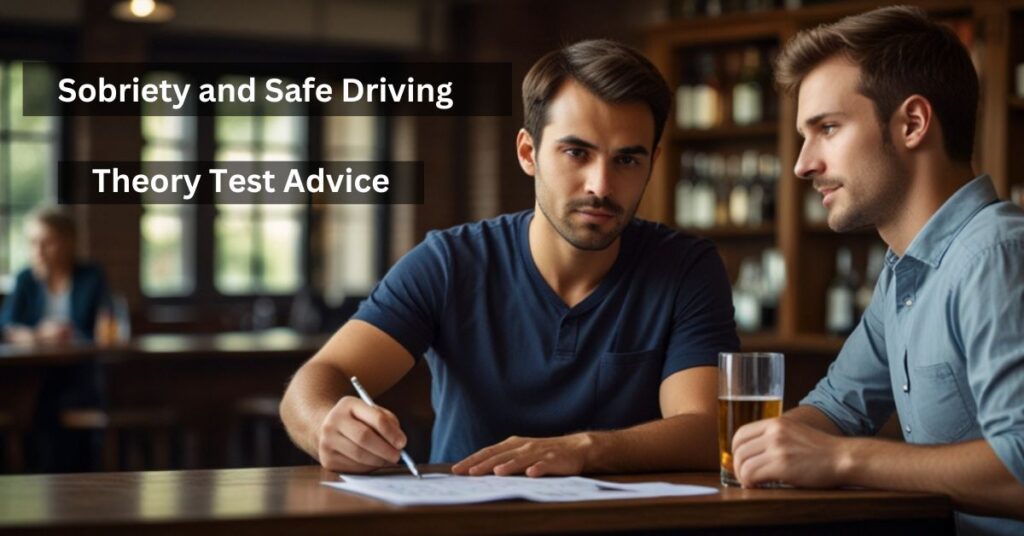When it comes to road safety, understanding how alcohol impairs driving is crucial. For law enforcement professionals, this knowledge not only aids in keeping roads safe but also in educating the public about the importance of responsible driving.
This blog post will explore how alcohol affects driving abilities, the underlying science, and why this is an important focus for driving theory tests.
1. The Science of Alcohol and the Brain

Alcohol’s Effects on the Brain
Alcohol primarily affects the central nervous system, leading to impaired judgment, reduced coordination, and slower reaction times. These effects are due to alcohol’s ability to interfere with neurotransmitters in the brain, which are responsible for transmitting signals.
Also Read: How to Get Off a Drink Driving Charge
Blood Alcohol Concentration (BAC)
Blood Alcohol Concentration, or BAC, measures the amount of alcohol in the bloodstream.
Higher BAC levels lead to more severe impairments, affecting functions like motor skills and cognitive abilities. Even at low BAC levels, drivers experience minor impairment, which can be dangerously misleading as it still affects their ability to drive safely.
2. Key Impairments Caused by Alcohol for Drivers

Delayed Reaction Time
Alcohol consumption results in slower response times, making it difficult to react swiftly to unexpected events such as sudden stops or obstacles on the road.
Reduced Concentration
Alcohol affects the brain’s ability to focus on multiple stimuli. This means drivers may struggle to pay attention to road signs, pedestrians, and other vehicles simultaneously, increasing the risk of accidents.
Poor Decision-Making
Judgment becomes impaired under the influence of alcohol, leading to risky behaviors such as speeding, running red lights, or aggressive driving techniques that could endanger lives.
Also Read: Drink Driving Cases Thrown Out of Court
Decreased Vision
Alcohol can impair depth perception and blur vision, making it challenging to accurately gauge distances, which is critical when navigating traffic and avoiding collisions.
3. Alcohol and Driving Skills: Theory Test Implications

Impact on Hazard Perception
Understanding the effects of alcohol on hazard perception is essential. Those under the influence tend to have a diminished ability to recognize and react to potential hazards, a critical component tested in driving theory exams.
Increased Likelihood of Accidents
Statistical data consistently show that driving under the influence significantly raises the risk of accidents. Acknowledging these statistics is vital for law enforcement and drivers to comprehend the severe consequences of impaired driving.
Traffic Laws and BAC Limits
Knowing the legal BAC limits is fundamental. These limits are established to maintain public safety and are strictly enforced to deter impaired driving. Highlighting the rationale behind these laws is a key part of driving education.
4. Psychological Effects on Driving Behavior

Overconfidence
Alcohol often instills a false confidence, leading drivers to believe they have more control over the vehicle than they actually do. This overconfidence can result in reckless and dangerous driving.
Also Read: Can I Travel to the USA with a Drink Driving Conviction?
Impaired Risk Assessment
A crucial aspect of passing driving theory and practical tests is the ability to accurately assess risks. Alcohol impairs this ability, making it difficult to judge situations and respond appropriately.
5. Sobriety and Safe Driving: Theory Test Advice

Legal Repercussions
Driving under the influence carries severe legal consequences, including fines, license suspension, and imprisonment. Understanding these repercussions is crucial for any driver.
Alternative Solutions
To avoid impaired driving, planning is key. Options like designating a sober driver, using public transit, or calling a taxi are vital alternatives that ensure safety.
Reinforcement in Driving Theory Tests
Driving theory tests emphasize the dangers of impaired driving to ensure that all drivers understand their responsibilities. Reinforcing this knowledge is essential to promoting safe driving habits.
Also Read: Can You Get an ESTA with a Drink Driving Conviction?
Conclusion
For law enforcement, understanding how alcohol affects driving behavior is not only a matter of public safety but also an educational responsibility. By comprehending the science and implications of alcohol impairment, officers are better equipped to enforce laws and educate the public, ultimately contributing to safer roads for everyone
